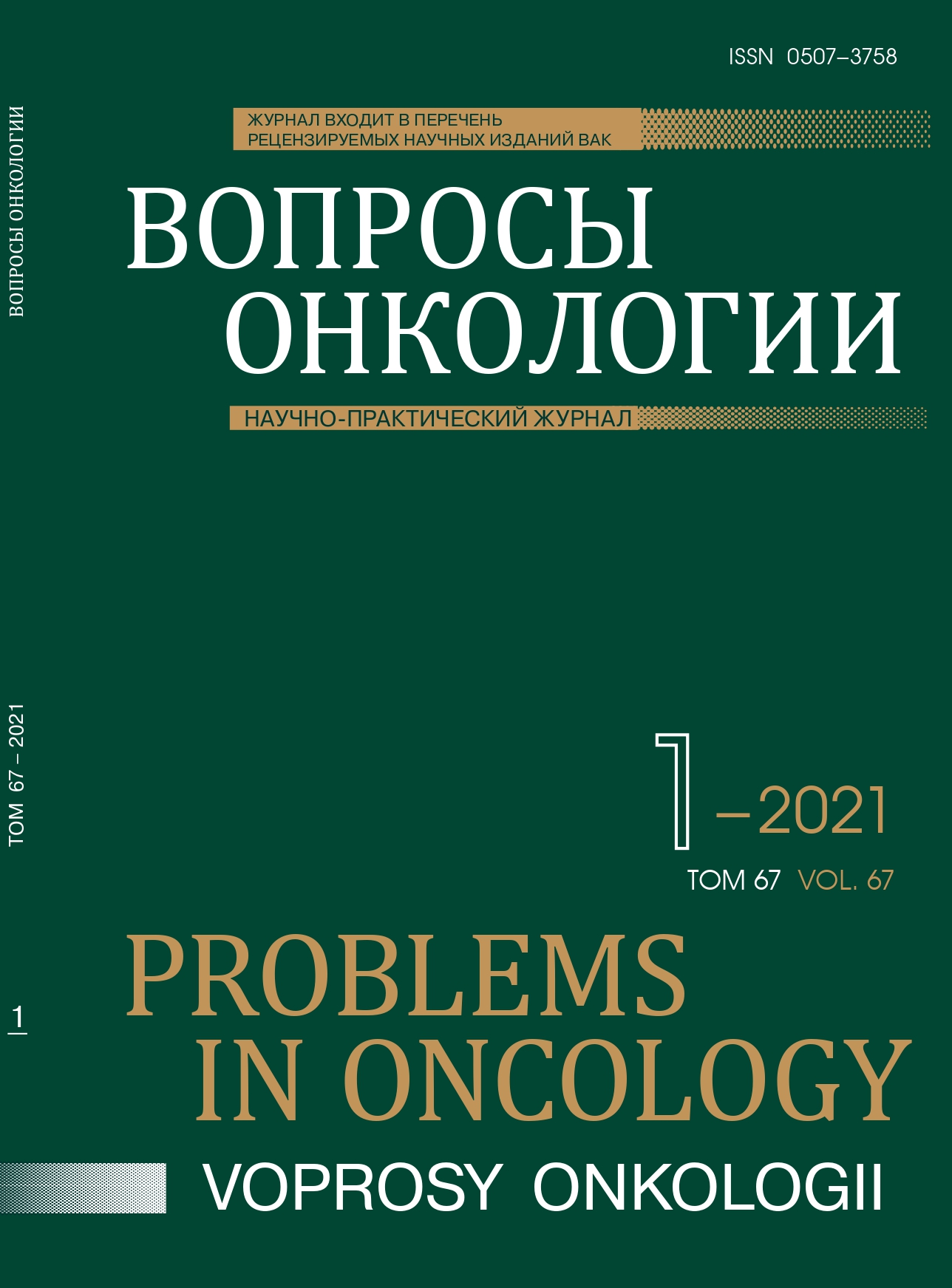Abstract
In patients with moderately differentiated endometrial cancer with less than half myometrial invasion, there are no specific indications for performing or not performing lymphadenectomy. Given the high prevalence of metabolic syndrome (MS) among patients with endometrial cancer (up to 62%) and a large proportion of G2 tumors in combination with MS, the anthropometric and hormonal-metabolic parameters were considered for predicting the risk of lymphogenous metastasis. To build a model of preoperative prognosis of lymphogenous metastasis, the method of logistic regression was used. Data on 53 patients with stage I endometrial cancer was analyzed. All patients underwent total laparoscopic hysterectomy with bilateral salpingo-ovariectomy and pelvic lymphadenectomy. Positive lymph nodes were found in the surgical specimen of six patients. The additional risk parameters for lymphogenous metastasis were revealed in patients with stage I endometrial cancer, namely: leptin level (AUC = 0.957), visfatin level (AUC = 0.918), body mass index (AUC = 0.911), patient age (AUC = 0.828), and HDL cholesterol (AUC = 0.699). In addition to traditional risk factors (the depth of invasion and tumor differentiation grade), the model of preoperative prediction of the risk of lymphogenous metastasis for patients with intermediate- risk stage I endometrial cancer included the following parameters: age, body mass index, HDL cholesterol, level of adipose hormones leptin and visfatin in blood plasma.. The sensitivity and specificity of the model were 83.3% and 97.9%, respectively.
References
Очиров М.О., Трухачева Н.Г., Коломиец Л.А. и др. МРТ в дооперационном прогнозировании риска лимфогенного метастазирования у больных раком эндометрия первой клинической стадии. Росс. электр. журнал лучевой диагностики.2018;8(3):190-204 [Ochirov M.O., Trukhacheva N.G., Kolomiets L.A. et al. МRI in preoperative prediction of the risk of lymph node metastasis in patients with endometrial cancer of the first clinical stage. REJR 2018; 8 (3):190-204. doi:10.21569/2222-7415-2018-8-3-190-204 (In Russ.)].
Нечушкина В.М., Морхов К.Ю., Кузнецов В.В. и др. Современные подходы к хирургическому лечению рака тела матки ранних стадий. Вопросы онкологии. 2015;61(3):346‐351 [Nechushkina V.M., Morkhov K.Y., Kuznetsov V.V. et al. Modern approaches to the surgical treatment for early-stage endometrial cancer. Vopr Onkol. 2015;61(3):346‐351 (In Russ.)].
Бочкарева Н.В., Коломиец Л.А., Кондакова И.В. и др. Ферменты метаболизма эстрогенов при раке эндометрия. БЭБиМ. 2006;141(2):240‐242 [Bochkareva N.V., Kolomiets L.A., Kondakova I.V. et al. Enzymes of estrogen metabolism in endometrial cancer. Bull Exp Biol Med. 2006;141(2):240‐242. doi:10.1007/s10517-006-0138-8 (In Russ.)].
Кишкина А.Ю., Коломиец Л.А., Юнусова Н.В. Клинические варианты метаболического синдрома у больных раком эндометрия. Сибирский Онкологический Журнал. 2019; 18(5): 38–44. [Kishkina A.Yu., Kolomiets L.A., Yunusova N.V. Clinical options for metabolic syndrome in patients with endometrial cancer. Siberian Journal of Oncology. 2019; 18(5): 38-44. – doi: 10.21294/1814-4861-2019-18-5-38-44 (In Russ.)].
Mahdi H., Jernigan A.M., Aljebori Q. et al. The impact of obesity on the 30-day morbidity and mortality after surgery for endometrial cancer. J Minim Invasive Gynecol. 2015;22:94-102.
Suidan R.S., He W., Sun C.C. Impact of body mass index and operative approach on surgical morbidity and costs in women with endometrial carcinoma and hyperplasia. Gynecol Oncol. 2017;145:55-60.
Bouwman F., Smits A., Lopes A. et al. The impact of BMI on surgical complications and outcomes in endometrial cancer surgery: An institutional study and systematic review of the literature. Gynecol Oncol. 2015;139(2):369-76.
Mariani A., Dowdy S., Cliby W.A. et al. Prospective assessment of lymphatic dissemination in endometrial cancer: a paradigm shift in surgical staging. Gynecol Oncol. 2008; 109(1):11-18.
Yang B., Shan B., Xue X. et al. Predicting Lymph Node Metastasis in Endometrial Cancer Using Serum CA125 Combined with Immunohistochemical Markers PR and Ki67, and a Comparison with Other Prediction Models. PLoS ONE. 2016; 11(5):e0155145. doi:10.1371/journal.pone.0155145.
Catalano S., Mauro L., Marsico S. et al. Leptin induces, via ERK1/ERK2 signal, functional activation of estrogen receptor alpha in MCF-7 cells. J. Biol. Chem. 2004; 279(19):19908-15.
Kim A.Y., Lee Y.S., Kim K.H. et al. Adiponectin represses colon cancer cell proliferation via AdipoR1- and -R2-mediated AMPK activation. Mol. Endocrinol. 2010; 24(7): 1441-52.
Koda M., Sulkowska M., Wincewicz A. et al. Expression of leptin, leptin receptor, and hypoxia-inducible factor 1 alpha in human endometrial cancer. Ann N Y Acad Sci. 2007; 1095: 90-8.
Gao J., Tian J., Lu Y. et al. Leptin induces functional activation of cyclooxygenase-2 through JAK2/STAT3, MAPK/ERK, and PI3K/AKT pathways in human endometrial cancer cells. Cancer Sci. 2009;100(3):389-95.
Ilhan T.T. , Kebapcilar A., Yilmaz S.A. et al. Relations of serum visfatin and resistin levels with endometrial cancer and factors associated with its prognosis. Asian Pac J Cancer Prev. 2015; 16(11):4503-8.
Tian W., Zhu Y., Wang Y. et al. Visfatin, a potential biomarker and prognostic factor for endometrial cancer. Gynecol Oncol. 2013; 29(3): 505-12.
Шпаков А.О. Висфатин и его роль в регуляции репродуктивной системы. Трансляционная медицина. 2019; 6(2): 25-36 [Shpakov AO. Visfatin and Its Role in the Regulation of the Reproductive System. Translyatsionnaya meditsina=Translational Medicine. 2019;6(2):25–36. (In Russ.)].

This work is licensed under a Creative Commons Attribution-NonCommercial-NoDerivatives 4.0 International License.
© АННМО «Вопросы онкологии», Copyright (c) 2021
